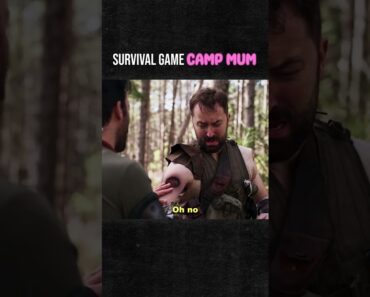In recent American history, there have been times when we all believed that our actions would bring the end of humanity as we know it due to nuclear war. The Cuban missile crisis in 1962 was one of these moments, and with the recent invasion of Ukraine by Russia, the topic of nuclear war was once more brought to people’s attention by the media.
In fact, a little-known fact is that most of today’s preppers are part of the generation that started making preparations for nuclear war back in the ’60s. American families took action back then, and they built bunkers and made other preparations to survive “nuclear winter”. For the last five decades or so, the world has changed, not necessarily for the better, and it seemed that this worst-case scenario was left in the past.
While most of us still question our world’s future, it seems that for the current generation, nuclear war is mostly a Hollywood movie script, and all they know about this type of war comes mostly from myths surrounding this topic. Many of these myths and unknowns usually cause confusion amongst the population, and it’s better to get a little more insight into the matter to know what we should expect if a nuclear holocaust occurs.
Myths surrounding nuclear wars
When people hear words like “nuclear war” and “atomic bomb,” they often believe that there’s no survival and that it’s a total apocalypse. This is a dangerous belief because it makes people feel useless, and they end up doing nothing to prepare for such a disaster.
They believe that the entire United States would be destroyed by nuclear fallout, and there’s nothing they can do about it. In fact, that’s a wrong assumption because it would be impossible for a country to use its entire nuclear arsenal. Some of their nuclear weapons and their delivery systems may not work, be down for maintenance, or they simply won’t be in a favorable position to fire.
Also, we have to acknowledge that not everyone on the world’s map will like nuclear war, so if one country does decide to use it, there’s no guarantee that other countries will retaliate, leading to mutually assured destruction. If nukes will start flying and everyone bombs each other, there won’t be anyone left; there will be no winners.
How many nuclear weapons are out there, and how practical are they?
After WWII, our country started building a large nuclear arsenal as it was competing with the Soviet Union. This went on for years, and the British, French, Chinese, and other nations joined the movement. It is estimated that at some point, there were over 60,000 nuclear warheads spread across the globe. With the help of various international treaties, that number was reduced to about 16,000. Even if this number may seem lower, there are still more than enough nuclear weapons to destroy the entire world.
Our country got better at making nuclear weapons, and just like other nations, we started making them smaller and smaller. We’ve come a long way from the delivery system used in WWII when bombs had to be dropped, and nowadays, we can even equip satellites with nuclear payloads.
A little know fact is that North Korea has launched satellites that they claim would be used for communication purposes, but their polar orbit would suggest otherwise. Nobody knows what they are, but one thing is certain, if they were communication satellites, they should have been in an equatorial orbit.
Nuclear warheads have been optimized so much that they can be fitted into 155mm projectile shells. Besides constant optimization, there are also massive nuclear bombs that can cause incredible devastation, and these can be equipped on intercontinental missile systems, submarines, and even drones.
Will a nuclear attack come from a nuclear superpower or a terrorist organization?
While the initial showoff muscle routine after WWII was between the United States and the Soviet Union, more and more nations joined the club as time passed. The problem with so many nations having nuclear arsenals is that terrorist organizations could have access to these weapons by stealing or buying them. If they end up getting their hands on a nuclear device, they would be able to launch/detonate it as an act of terrorism. Nothing is off the table when it comes to terrorist attacks.
While an all-out nuclear attack from one of the nuclear superpowers is often the most plausible scenario when debating the topic of nuclear war, a terrorist organization or rouge country releasing a dirty bomb is considered by many military experts the most probable scenario.
Such an attack will cause incredible psychological damage, and that is what these groups are after. Striking fear in the minds and hearts of people and making them feel uncertain about their future is the main goal of these organizations.
The good thing is that getting their hands on radioactive material is very difficult, and it would be quite hard to sneak such material into a country to build a bomb. To succeed, they would have to source the material locally and build the nuclear device on-site.
People believe that the ISIS group is history, but they are still highly organized and capable of causing trouble. They may be on the run, but they are far from being a thing of the past. They are still a threat, and there are many other hostile nations or terror groups out there. Hezbollah is also a threat, but we don’t fear them because they would probably attack Israel if they ever got their hands on such a device.
Some fear that Russia, after failing to conquer Ukraine, will result to using nuclear weapons as a final act, but such an action would trigger a massive military response, and things may escalate to such a degree that no one wants to put this theory to the test.
Which form of nuclear attack is the most probable against the United States?
There are two kinds of risks we need to consider. The first big risk is the large nuclear arsenal of Russia, China, and the United States. All three countries will use nuclear weapons preemptively if they believe they will be attacked. False launches, which may not be deliberate actions, are the potential that can create the circumstances where we would be forced to launch a nuclear weapon. This is one of my biggest fears, and I believe that something unintentional can lead to nuclear war, seeing the very large nuclear arsenals which are still in operation today.
The second big risk is the use of a dirty bomb which contains a precise amount of radioactive materials encased around an explosive charge. It’s not an atomic bomb, but it can destroy an entire city block, and the worst thing comes after. If such a bomb contains enough enriched plutonium or uranium, the radioactivity will make areas uninhabitable. Some people will die from the blast, while others will die from the radioactivity, which may take weeks or years for the effects to be noticed. The use of such devices in strategic areas of interest could cripple our country.
Are we prepared against a nuclear attack?
Back in the ’50s, there were designated places for people to go in case a nuclear attack happened, and civil defense was very active. Unfortunately, we don’t have much of that anymore since people believe a nuclear holocaust is not a high probability.
While preppers and those following this movement are more prepared, the general public lacks even basic notions of emergency preparedness, let alone nuclear war preparation. The national defense missile system has gotten better, but even so, it’s far from perfect. We are spending a lot of money building defenses, but our enemies are spending their resources to find ways to tear them down.
The somehow reassuring news is that we are more advanced in counterintelligence today than we were during September 11. We are more sophisticated in this regard, and we are getting better at intelligence. Even so, we can’t say this is a failproof method, and we can never say that we are prepared enough to counter a nuclear attack.
How can the average folks survive a nuclear attack?
There are people investing in doomsday bunkers, and while that can be a good measure concerning the current topic, we also have to understand that this may not be the right approach unless, of course, money is no problem for you.
These bunkers can protect a family inside a blast zone, but outside of it, they won’t be necessary. So if you consider buying or building such a bunker, do so if you live near potential bomb targets. If you live outside the blast zone of a potential target, your home can protect you from nuclear fallout as long as you find ways to secure the windows and doors.
Keep some potassium iodide pills on hand since radioactive iodide is present in the nuclear fallout, and these pills are effective against it by filling your body with regular iodide that blocks the radioactive iodide from entering your system.
Just like with everything in life, information is key, and people need to learn how to separate fact from fiction when it comes to nuclear war, dirty bombs, and everything surrounding this topic. If people feel that there’s nothing they can do to prepare for such a scenario, they will leave things to chance, and that’s it.
If they can’t build a shelter, they should at least inform themselves and figure out what they can use as shelter to survive the blast and its aftermath. They should stay in those shelters for 12 to 24 hours until it’s declared safe to come out. It is estimated that they would have about 20 minutes to get inside a shelter after the initial blast, and they don’t necessarily need a bunker to stay safe. A building with thick walls or a basement would suffice in most cases. If everyone knew this and practiced it, we could reduce fatalities by up to 50 percent.
Getting a Geiger counter or something else to measure radiation, but also putting up a Faraday cage to protect your needed electronics are also inexpensive preps that can help. Acquiring a HAM radio and putting it in the Faraday cage becomes a must if you believe nuclear war will happen because it will become the main method of communication once the internet is gone.
Acquiring and storing food and water is, of course, mandatory, but if you are a prepper or preparedness like-minded, you’ve already made such preparation. You should make sure your bug-out bag and bug-out vehicle are ready at all times, and you should be able to carry whatever you believe would make your survival successful.
Concluding
A nuclear attack, contrary to the general belief, is definitely survivable if you’re not located at ground zero. Without a doubt, we can say that life would be more difficult after such an attack, but with a little hope and prepping, you can survive it.
The world has changed, and so have the geopolitical conflicts that separate nations. While a nuclear holocaust was recently brought, once again, to everyone’s radar due to the aggressive actions of Russia and the provocations of North Korea, this threat was never really gone. Do your best to inform yourself and make the necessary preparation to survive a nuclear threat.




























